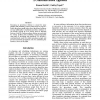Free Online Productivity Tools
i2Speak
i2Symbol
i2OCR
iTex2Img
iWeb2Print
iWeb2Shot
i2Type
iPdf2Split
iPdf2Merge
i2Bopomofo
i2Arabic
i2Style
i2Image
i2PDF
iLatex2Rtf
Sci2ools
AIPS
2006
2006
Incremental Maintenance of Double Precedence Graphs: A Constraint-Based Approach
Reasoning on precedence relations is crucial for many planning and scheduling systems. In this paper we propose a double precedence graph where direct precedence relations are kept additionally to traditional precedence relations (A can directly precede B if no activity must be allocated between A and B). Such precedence relations are motivated by solving problems like modelling sequence-dependent setup times or describing state transitions. We describe a constraint-based model for double precedence graphs and present incremental propagation rules for maintaining the transitive closure of the graph.
AIPS 2006 | Artificial Intelligence | Direct Precedence Relations | Double Precedence Graphs | Precedence Relations |
| Added | 30 Oct 2010 |
| Updated | 30 Oct 2010 |
| Type | Conference |
| Year | 2006 |
| Where | AIPS |
| Authors | Roman Barták, Ondrej Cepek |
Comments (0)

